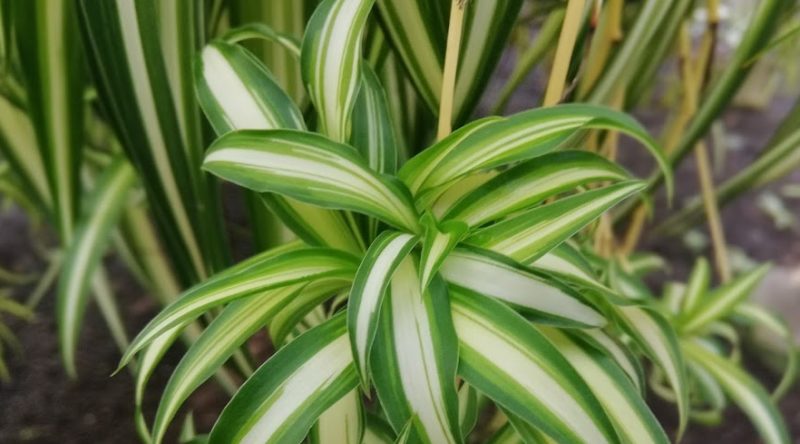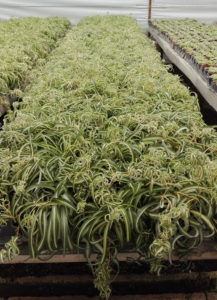
Let’s Talk Chlorophytum
Chlorophytum comosum, or spider plants, have been a foliage staple in our industry for as long as I have been alive, and much beyond that as well (I am trying very hard not to identify as young or old). They are a perennial flowering tropical plant native to Tropical and Southern Africa. This was one of the plants that I first had as a child that really got me into the love of plants and the industry that we are in. I remember watching the plants grow, develop their pups, and subsequently planting them and making new pots full of this quite common yet tremendously interesting plant. It was also the first plant my parents told me to stop making more of. Having grown up in the north, in Maryland, everything had to be brought inside for the winter and I had run out of space!
PRODUCING CHLOROPHYTUM
Much like a strawberry, chlorophytum are propagated through plantlets formed off a stolon (runner) off the mother plant. These plantlets are formed on the stolon and, as they grow, gravity forces them to the ground where they can root  and produce a new plant. For the production in the nursery, these plants are generally grown off the ground to avoid the rooting in, making the plantlets easy to pluck from the mother plant and rooted to start new production in a liner or another pot. I find this to be one of the more interesting methods that plants have developed to reproduce. Now only if my growing gut could be plucked off as a clone!
and produce a new plant. For the production in the nursery, these plants are generally grown off the ground to avoid the rooting in, making the plantlets easy to pluck from the mother plant and rooted to start new production in a liner or another pot. I find this to be one of the more interesting methods that plants have developed to reproduce. Now only if my growing gut could be plucked off as a clone!
VARIETIES
Chlorophytum come in a range of green and white variegations. Some of the most common varieties sold on the market include:
• Variegated – This is the most sold variety in the market. It consists of leaf blades that are a combination of white leaves with a green margin. The stolons are white on this variety.
• Reverse – These are very similar to the above, but the center of the leaf blade is dark green with white leaf margins. The stolons on this variety are green.
• Irish – This is a much more compact version of chlorophytum with much wider and shorter leaves then the more common varieties. These do come in both a green form and a variegated. The variegated variety has green leaves with white margins, although not as dark green as the reverse.
• Bonnie – This variety also comes in both a green and a variegated option. The variegation on this consists of white centers with green leaf margins. The most distinguishing feature of these are the curling effect of the leaves on the plant. It really gives a much different look to the common spider plant.
• Hawaiian – These grow similar to the Variegated, although the variegation holds a different color. The leaves are mostly green with a champagne colored streak through the middle of the leaf blades.
PLANT HEALTH
Although this is a very hardy plant, it does have some potential issues that need to be watched for and prevented. Control is relatively easy, making them an exceptional plant for production.
Tip burn. When you see a reddish color in the affected area, this is typically a result of fluoride toxicity. As all city water in the country contains fluoride, it is best to water these without city water. When you have a boron toxicity, the affected areas will become tan to gray in color.
Bleaching. When the plants are kept in too bright of light, it is common to see some bleaching of the leaves. This is easily resolved by moving into a lower light environment.
Root rot. This is likely the most common disease issue for spider plants. This can be avoided with proper wet/dry cycles and potentially preventative fungicide applications.
Mealy bugs and thrips. These are the most commonly seen pests on spider plants. With proper monitoring and insecticide applications this should be a very minor concern.
TIMING
The following are some guidelines on the timeline of production of
spider plants.

Chlorophytum are definitely an old standby that shows no signs of
slowing down. They are utilized in many environments from the patio to
indoors. With the current increase in demand of tropicals, especially due
to the pandemic, this is an item you will want as part of your mix, if it is
not already.


 Video Library
Video Library 




















